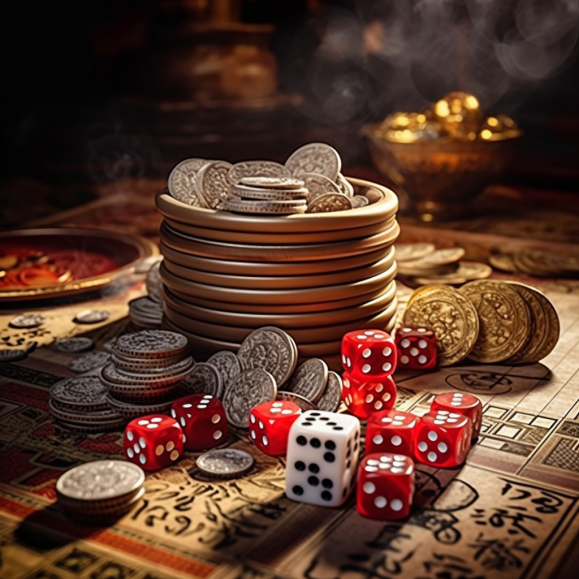Journeying to the East: China’s Pai Gow
At the heart of ancient Chinese gambling traditions is Pai Gow, a game that merges dominoes and poker. Played with a set of 32 Chinese dominoes, it’s a game of strategy where players create two ‘hands’ out of four tiles, aiming to beat the banker’s two hands. Its complex nature and the nuance required have made it a favorite for centuries, and its modern poker variant, Pai Gow Poker, sees players using cards instead of dominoes, illustrating its adaptability and enduring appeal.
Dice and Divination: Mesopotamia’s Ancient Games
In the dusty realms of Mesopotamia, the cradle of civilization, dice games have an ancient lineage. Archaeological finds have unearthed dice from as far back as 3000 BC. But for the Mesopotamians, dice weren’t just tools for entertainment; they were instruments of divination. Rituals and decisions, both mundane and critical, were often influenced by the cast of a die, emphasizing the profound spiritual significance these games held.
Indian Prowess: The Game of Pachisi
India, with its rich tapestry of history and culture, gave the world Pachisi, a strategic board game that has been enjoyed for over a millennium. Often considered a royal game, ancient texts and artwork depict kings enjoying Pachisi with live participants as game pieces. Its cross-shaped board and dependence on the roll of cowrie shells make it a precursor to modern board games, and its Western derivative, Ludo, continues to be popular today.
African Adventures: Mancala’s Deep Roots
Mancala, a game that involves a wooden board and seeds or stones, traces its origins to various parts of Africa. It’s a game of arithmetic strategy where players ‘sow’ and ‘capture’ seeds. With hundreds of variants across Africa and parts of Asia, Mancala is more than just a game; it’s a testament to human creativity and the universality of play. The way the game is woven into daily life, often played casually under trees in villages or during breaks in work, speaks volumes about its integral role in these cultures.
European Elegance: The Birthplace of Modern Casinos
Europe, particularly regions like Monaco and Italy, is synonymous with lavish casinos and the glamour of games like roulette and baccarat. But beyond these iconic images, Europe has a diverse gambling history. Games like ‘Hazard,’ a precursor to modern craps, was popular in medieval Europe and even mentioned in Geoffrey Chaucer’s ‘Canterbury Tales.’
The South American Spirit: The Lotería of Mexico
Venture to Mexico, and you’ll find families gathered around playing Lotería, a game akin to bingo. Using colorful, intricate cards instead of numbered balls, players mark their boards with tokens, often beans, as the caller reveals cards from the deck. It’s a game that interweaves cultural icons and symbols, fostering a community spirit and often accompanied by music and celebration.
Unity in Diversity
From the bustling streets of China to the vast deserts of Mesopotamia, from the vibrant landscapes of India to the serene villages of Africa, gambling games and traditions have been an integral part of human civilization. They’ve brought people together, been sources of joy, and even influenced history at times. This shared legacy of games, of risks and rewards, strategy and chance, underscores a fundamental truth: despite our diverse cultures and histories, the human spirit finds commonality in the thrill of the game.

